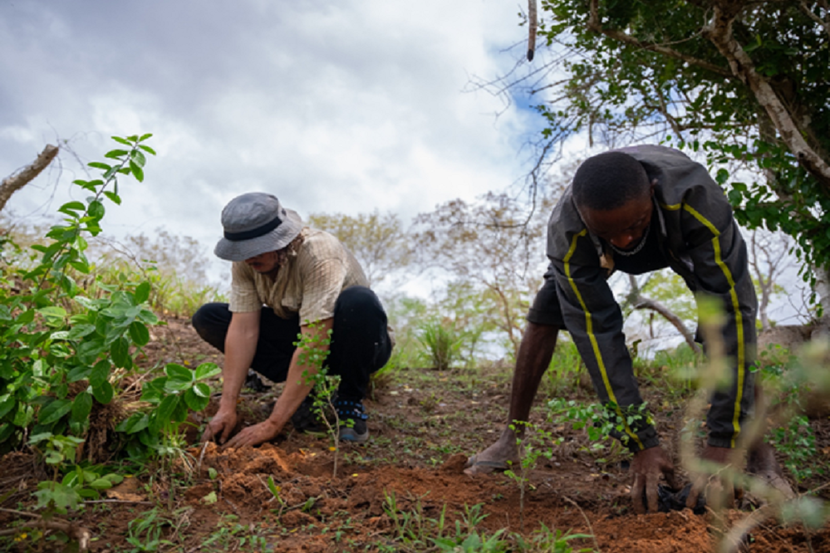Kenya: responsible reforestation by Capital Africa Agribusiness Ventures
Kenya aims to increase forest cover from 7% to 10% in 10 years, combating deforestation due to agriculture, charcoal production, and poor management. Capital Africa Agribusiness Ventures Ltd pioneers agroforestry in Koromi Farm, addressing ecological and financial goals through rainwater harvesting, diverse revenue streams, and ecosystem restoration. Scaling up the project promises to sell carbon and biodiversity credits, supporting communities in sustainable income generation and forest conservation.

Kenya's Forest Cover Challenges
Kenya has a forest cover of 7% and the government has committed to raising this to 10% in the coming 10 years. Kenya has lost a lot of forest area mainly due to conversion to agricultural activities and other uses, charcoal production, poor forestry management, forest fires and unplanned grazing. Loss of forest cover is particularly severe in the Arid and Semi-Arid Lands, which comprises over 80% of Kenya.
By increasing the forest cover, the currently deteriorating ecosystem health in most areas can be reversed, counteracting the negative impact of deforestation on the soil and climate, as well as mitigating the impact of global climate change. But reforestation will only be successful if reforestation brings tangible benefits to local communities, that are often seeing no alternative to charcoal production, illegal logging, poaching and freerange grazing. As most of Kenya is not suitable for traditional agricultural production: due to a lack of rainfall the rain-fed production of traditional staple crops mostly fails in the dryer areas of Kenya.

Responsible reforestation by integrating agroforestry and nature conservation in arid and semi-arid areas in Kenya
Bob van der Bijl saw the need to develop a model for a different land-use in drought-prone areas and founded Capital Africa Agribusiness Ventures Ltd in 2017. Capital Africa is a private company that is developing an innovative agro-forestry project on 200 hectares of land at Koromi Farm on the edge of the Dakatcha Woodlands, 65 kilometers to the West of Malindi.

The objective of the project is two-fold: create both financial as well as ecological results through a combination of biodiverse reforestation, agroforestry and nature conservation. Harvesting rainwater is a crucial enabler, as well as having various revenue streams, that can entice landowners and local communities to adopt the system. Besides timber, the system provides tree seeds for cosmetic oils, honey as well as fish.

“Despite a challenging climate with severe droughts, we have managed to achieve very good growth rates of our trees, and we see a transformation of the land with a much better soil cover and improving survival rates of planted trees. We now want to combine large scale rainwater harvesting with fish farming: we have called this concept Aquaforestry.” - Bob van der Bijl
Collaboration and research
Capital Africa also works on improved tree seedling propagation and is testing many tree species before planting them in larger numbers. Capital Africa is supported by Kenyan knowledge institutions, various Dutch consultants (Growpact, Acacia Water, the Saltdoctors), the Netherlands Embassy in Kenya and from Netherlands Water Partnership; in order to improve the quality of tree seedlings, the quality of water management, and the development of new methods, products and services. One example is the use of harvested rainwater for fish farming and fertigation of the trees. Through a collaboration with the Dutch company WoodYouCare is possible for companies and individuals to directly support the planting of trees.
Ecosystem restoration and the conservation of biodiversity is a key pillar of the agroforestry concept of Capital Africa: around a quarter of the land will remain nature and the trees planted for timber production are mixed with other trees, with some of them producing seed-oil for cosmetics. Koromi Farm is a member of Ecosystem Restoration Communities and through this organisation international volunteers come over to provide knowledge and assistance to the project.

Scaling up
Capital Africa’s next step is scaling up the size of the project and start an out-grower programme with local conservation NGO’s. The market for carbon- and biodiversity credits is growing and investors are especially interested in larger projects when it comes to reforestation and conservation.
“Scaling up the project will also enable us to sell biodiversity- and carbon credits. This will enable us to make more impact and to assist local communities to move away from deforestation towards earning a better income by working with nature, and to benefit from the value of the natural resources in the area in a sustainable way”. - Bob van der Bijl
Before (L) and after (R) the rainy season


Contact
For more information about this sector or any other agricultural questions feel free to contact us via nai-lnv@minbuza.nl. For the latest updates on activities, new articles and more follow us on X (Twitter) on @NLAgiKenya and subscribe to our newsletter by sending us an email. In case of any non-agriculture questions for the Netherlands Embassy in Nairobi, see this website for contact information